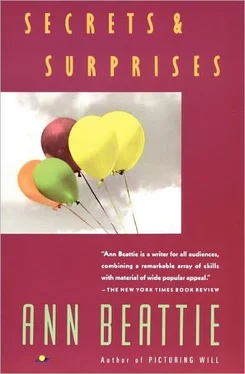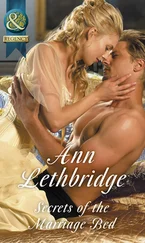“It’s just terrible about Anna,” George says, finishing his wine, his ice cream melting, looking at no one in particular, although Sarah was the one who brought up Anna the night before, when they had been in the house only a short time — Anna dead, hit by a car, hardly an accident at all. Anna was also a student of his. The driver of the car was drunk, but for some reason charges were not pressed. (Sarah and George have talked about this before, but Lenore blocks it out. What can she do about it? She met Anna once: a beautiful girl, with tiny, childlike hands, her hair thin and curly — wary, as beautiful people are wary.) Now the driver has been flipping out, Julie says, and calling Anna’s parents, wanting to talk to them to find out why it has happened.
The baby begins to cry. Lenore goes upstairs, pulls up more covers, talks to him for a minute. He settles for this. She goes downstairs. The wine must have affected her more than she realizes; otherwise, why is she counting the number of steps?
In the candlelit dining room, Julie sits alone at the table. The girl has been left alone again; George and Sarah took the umbrellas, decided to go for a walk in the rain.
• • •
It is eight o’clock. Since helping Lenore load the dishes into the dishwasher, when she said what a beautiful house Lenore had, Julie has said very little. Lenore is tired, and does not want to make conversation. They sit in the living room and drink wine.
“Sarah is my best friend,” Julie says. She seems apologetic about it. “I was so out of it when I came back to college. I was in Italy, with my husband, and suddenly I was back in the States. I couldn’t make friends. But Sarah wasn’t like the other people. She cared enough to be nice to me.”
“How long have you been friends?”
“For two years. She’s really the best friend I’ve ever had. We understand things — we don’t always have to talk about them.”
“Like her relationship with George,” Lenore says.
Too direct. Too unexpected. Julie has no answer.
“You act as if you’re to blame,” Lenore says.
“I feel strange because you’re such a nice lady.”
A nice lady! What an odd way to speak. Has she been reading Henry James? Lenore has never known what to think of herself, but she certainly thinks of herself as being more complicated than a “lady.”
“Why do you look that way?” Julie asks. “You are nice. I think you’ve been very nice to us. You’ve given up your whole weekend.”
“I always give up my weekends. Weekends are the only time we socialize, really. In a way, it’s good to have something to do.”
“But to have it turn out like this …” Julie says. “I think I feel so strange because when my own marriage broke up I didn’t even suspect. I mean, I couldn’t act the way you do, anyway, but I—”
“For all I know, nothing’s going on,” Lenore says. “For all I know, your friend is flattering herself, and George is trying to make me jealous.” She puts two more logs on the fire. When these are gone, she will either have to walk to the woodshed or give up and go to bed. “Is there something … major going on?” she asks.
Julie is sitting on the rug, by the fire, twirling her hair with her finger. “I didn’t know it when I came out here,” she says. “Sarah’s put me in a very awkward position.”
“But do you know how far it has gone?” Lenore asks, genuinely curious now.
“No,” Julie says.
No way to know if she’s telling the truth. Would Julie speak the truth to a lady? Probably not.
“Anyway,” Lenore says with a shrug, “I don’t want to think about it all the time.”
“I’d never have the courage to live with a man and not marry,” Julie says. “I mean, I wish I had, that we hadn’t gotten married, but I just don’t have that kind of … I’m not secure enough.”
“You have to live somewhere,” Lenore says.
Julie is looking at her as if she does not believe that she is sincere. Am I? Lenore wonders. She has lived with George for six years, and sometimes she thinks she has caught his way of playing games, along with his colds, his bad moods.
“I’ll show you something,” Lenore says. She gets up, and Julie follows. Lenore puts on the light in George’s study, and they walk through it to a bathroom he has converted to a darkroom. Under a table, in a box behind another box, there is a stack of pictures. Lenore takes them out and hands them to Julie. They are pictures that Lenore found in his darkroom last summer; they were left out by mistake, no doubt, and she found them when she went in with some contact prints he had left in their bedroom. They are high-contrast photographs of George’s face. In all of them he looks very serious and very sad; in some of them his eyes seem to be narrowed in pain. In one, his mouth is open. It is an excellent photograph of a man in agony, a man about to scream.
“What are they?” Julie whispers.
“Pictures he took of himself,” Lenore says. She shrugs. “So I stay,” she says.
Julie nods. Lenore nods, taking the pictures back. Lenore has not thought until this minute that this may be why she stays. In fact, it is not the only reason. It is just a very demonstrable, impressive reason. When she first saw the pictures, her own face had become as distorted as George’s. She had simply not known what to do. She had been frightened and ashamed. Finally she put them in an empty box, and put the box behind another box. She did not even want him to see the horrible pictures again. She does not know if he has ever found them, pushed back against the wall in that other box. As George says, there can be too much communication between people.
Later, Sarah and George come back to the house. It is still raining. It turns out that they took a bottle of brandy with them, and they are both drenched and drunk. He holds Sarah’s finger with one of his. Sarah, seeing Lenore, lets his finger go. But then he turns — they have not even said hello yet — and grabs her up, spins her around, stumbling into the living room, and says, “I am in love.”
Julie and Lenore watch them in silence.
“See no evil,” George says, gesturing with the empty brandy bottle to Julie. “Hear no evil,” George says, pointing to Lenore. He hugs Sarah closer. “I speak no evil. I speak the truth. I am in love!”
Sarah squirms away from him, runs from the room and up the stairs in the dark.
George looks blankly after her, then sinks to the floor and smiles. He is going to pass it off as a joke. Julie looks at him in horror, and from upstairs Sarah can be heard sobbing. Her crying awakens the baby.
“Excuse me,” Lenore says. She climbs the stairs and goes into her son’s room, and picks him up. She talks gently to him, soothing him with lies. He is too sleepy to be alarmed for long. In a few minutes he is asleep again, and she puts him back in his crib. In the next room Sarah is crying more quietly now. Her crying is so awful that Lenore almost joins in, but instead she pats her son. She stands in the dark by the crib and then at last goes out and down the hallway to her bedroom. She takes off her clothes and gets into the cold bed. She concentrates on breathing normally. With the door closed and Sarah’s door closed, she can hardly hear her. Someone taps lightly on her door.
“Mrs. Anderson,” Julie whispers. “Is this your room?”
“Yes,” Lenore says. She does not ask her in.
“We’re going to leave. I’m going to get Sarah and leave. I didn’t want to just walk out without saying anything.”
Lenore just cannot think how to respond. It was really very kind of Julie to say something. She is very close to tears, so she says nothing.
“Okay,” Julie says, to reassure herself. “Good night. We’re going.”
Читать дальше












